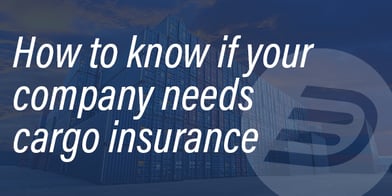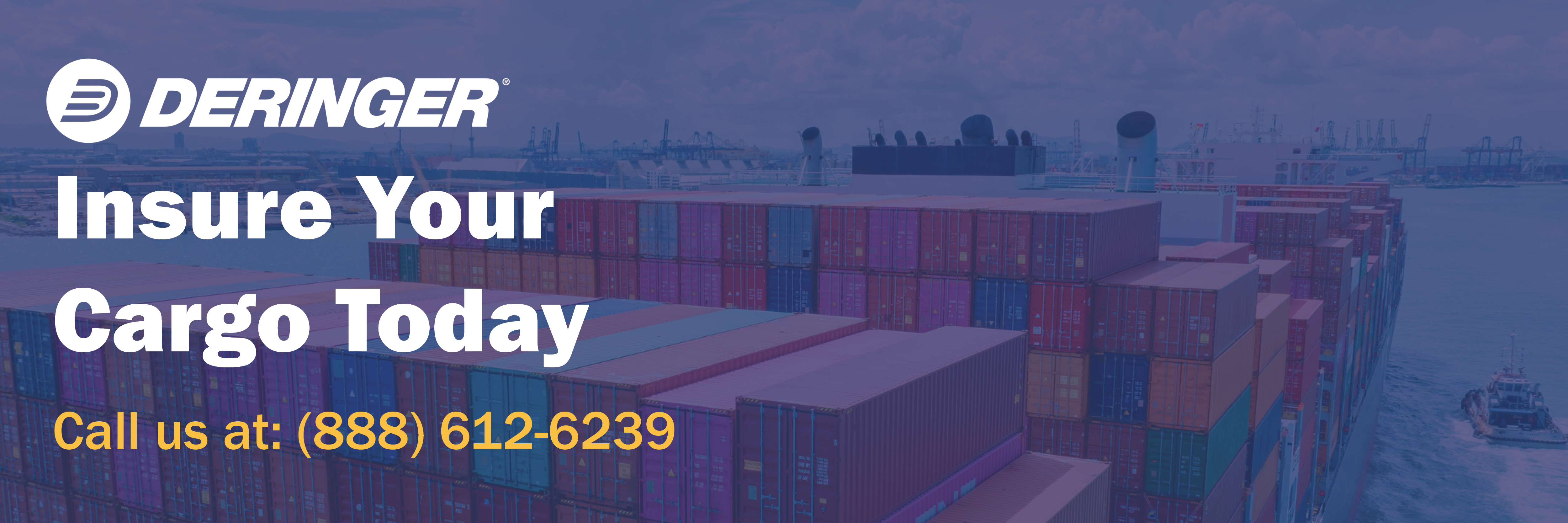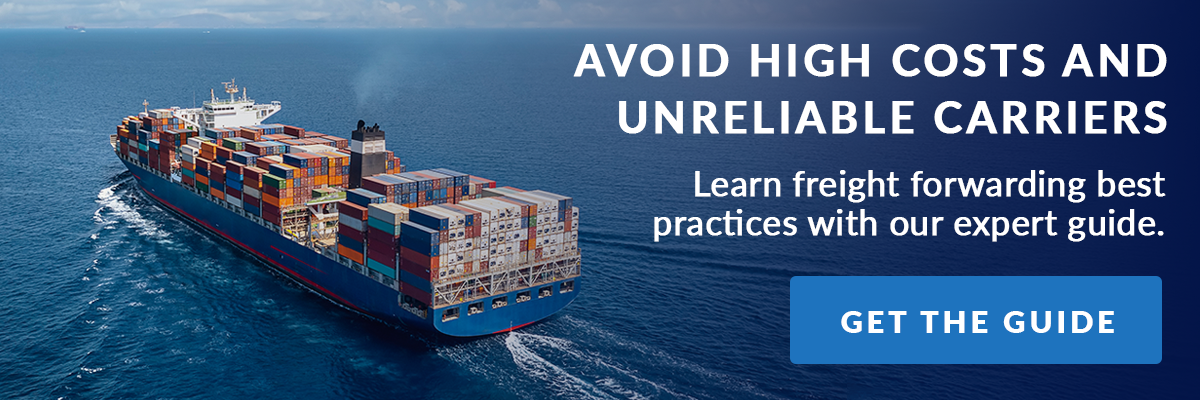
Insurance is important for your home, car, and healthcare, but do you really need it to cover your cargo? The short answer is yes.
While nearly 226 million containers shipped annually make it to their destination, containers still get lost at sea every year. The World Shipping Council reports an average of 1,382 containers lost between 2008 and 2019. A spate of container losses—more than double the reported average—happened between Nov. 30, 2020, and Jan. 31, 2021, further highlighting the importance of cargo insurance.
Shippers can hedge their bets and hope the lost containers don’t belong to them—but taking chances can cost millions. Without cargo insurance, companies must pay for lost merchandise, plus all freight and transport costs. They may also be liable for the cargo losses of others in General Average emergencies. The law of General Average is:
“A principle of maritime law wherein the event of an emergency, if cargo is jettisoned or expenses incurred, the loss is shared proportionately by all parties with a financial interest in the voyage.”
What is Cargo Insurance?
Just as the auto insurance industry offers distinct types of insurance, the transport industry provides a variety of cargo insurance types for different situations.
When shipping by sea, the best coverage is marine cargo insurance, which covers all forms of transport, whether truck, train, plane, or ship.
However, not all marine cargo insurance is created equal. Freight forwarders recommend all-risk insurance with full coverage. This insurance covers most physical losses and cargo damages, whether a full or partial cargo loss. An all-risk policy may even cover General Average situations, which puts your company on the hook for cargo losses incurred by others on the same vessel.
When selecting all-risk insurance, pay attention to what the insurance will cover. Some insurers pay more than others. An insurance policy that pays 110% of the invoice value, plus freight costs, duty, and taxes, provides complete protection.
All-risk insurance will not cover used items. For example, if you’re shipping used machinery, you will not be eligible for all-risk insurance. Keep in mind that it would be difficult to prove any dents and scratches that happened during shipping.
Who Needs Cargo Insurance?
Importers must protect the shipping costs, whether a small parcel moved by air or a large container shipped by sea.
Every carrier has varying limits of liability as they move your freight. Trucking companies usually cover $2 a pound, air carriers set liability at $20 a kilo, and ocean carriers put liability at $500 per container. For small parcels, this coverage may be sufficient. But for larger loads, these limits will not cover your costs when cargo gets lost or damaged.
While shippers can roll the die and hope for the best, investing in cargo insurance remains a better option in most cases. Cargo insurance costs little compared to the cost of losing your goods.
Make sure the insurance you select also covers General Average. If a ship captain declares General Average, sacrificing cargo to save lives or the vessel itself, all stakeholders with containers on the ship share the financial responsibility of the lost cargo. If the container is full of electronics, the costs may run millions.
Cargo insurance does not always include General Average. Make sure it’s in your policy. Though General Average claims only happen an average of every eight years, you don’t want to be on the hook for these costs.
How to Get Cargo Insurance
Shippers can acquire cargo insurance through their freight forwarder or a separate insurance provider.
Many corporations add cargo insurance as a rider on their general liability policy. Here, it’s important to make sure you’ve chosen all-risk insurance that provides actual coverage. Sometimes it’s just an add-on that offers little coverage for cargo loss.
Be sure to read the policy and understand the coverage you are paying for. It’s possible to get a blanket policy that covers everything. Or you can opt for declared value, which often is mistaken for cargo insurance. In reality, they are quite different.
Declared value is the cost of a shipped item, as stated by the shipper. When you declare that the value of your goods is $100,000, for example, the carrier must insure your container for that amount. This protection can be expensive, as carriers charge higher prices to insure for declared value. Still, some coverage is better than no coverage at all.
What Does Cargo Insurance Cost?
Cargo insurance costs vary. Many things can affect insurance costs: the commodity, where goods ship to and from, overall value, and the risk of theft.
A blanket policy requires an insurance underwriter. An underwriter sifts through how much the company ships, annual shipment values, and other details to underwrite a policy.
Costs will change to reflect the commodity in shipment-by-shipment policies. For instance, shipping coffee cups will cost far less than moving dynamite. In these cases, you can expect to pay more to insure your cargo:
- Inherent vice. If the commodity falls under inherent vice, it is a dangerous commodity and will cost more to insure.
- High-value and high-pilfer products. These may be expensive products, like computers or diamonds, that are also high-theft items.
- Goods leaving/going to high-risk areas. Cargo shipping from China to L.A. won’t cost as much as cargo shipping from Somalia to Iraq, which is less safe.
- Restricted commodities. Sometimes blanket policies exclude some commodities. Rare artwork, priceless antiques, high-value goods, and certain hazardous products fall into this category. This type of policy requires a specialized quote adjusted for restricted commodities.
RELATED CONTENT: INCOTERMS SHIPPERS MUST KNOW
Know Your Incoterms®
When buying, selling, or shipping goods internationally, you need to understand Incoterms®. They detail the responsibilities of every stakeholder involved and highlight your insurance needs.
Incoterms® are regulations that standardize the buying and selling of goods and detail the responsibilities of buyers and sellers as goods move from Point A to Point B.
Common Incoterms® include:
- EXW: Ex-Works
- DAP: Delivered at Place
- DDP: Delivered Duty Paid
- CFR: Cost and Freight
- CIF: Cost, Insurance, and Freight
Control, possession, and liability do not automatically transfer from seller to buyer. You must know when you assume or hand over risk, determining when responsibility for insuring cargo transfers to you.
For example, if Ex-Works (EXW) is the Incoterms® you agreed to, liability for the goods transfers at the seller’s factory when goods are ready for pickup. You must insure the goods immediately, even if you don’t pick up your shipment for several days.
Your freight forwarder can help you select the best Incoterms® for your shipment and make sure your cargo is covered during all legs of its journey.
Hedging your bets on uninsured cargo making it to its destination is folly. Protect your financial interests with a sound strategy that includes all-risk cargo insurance.





